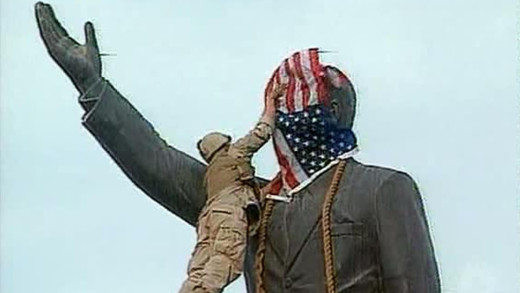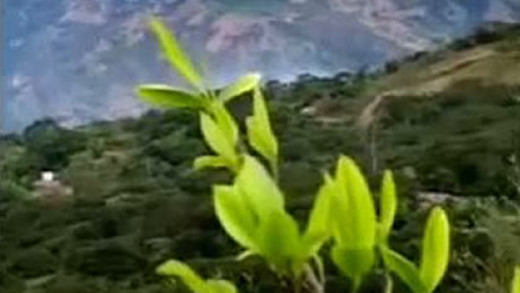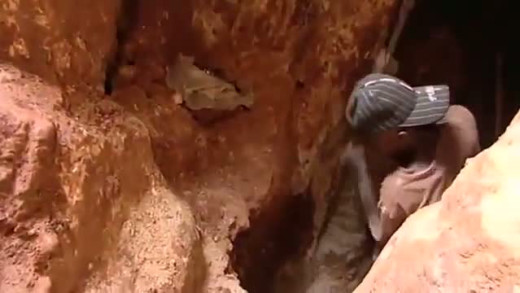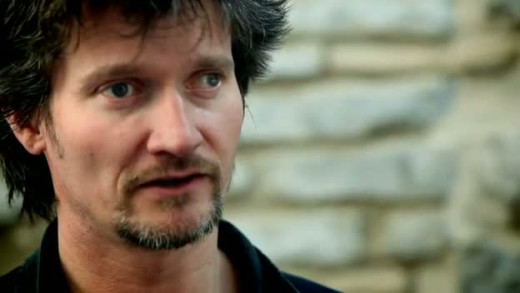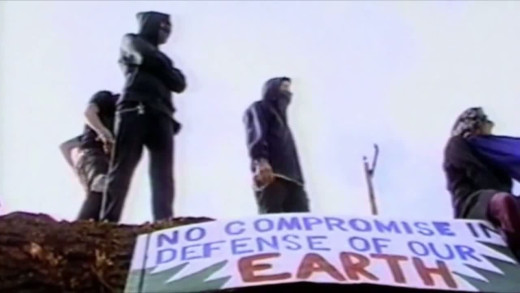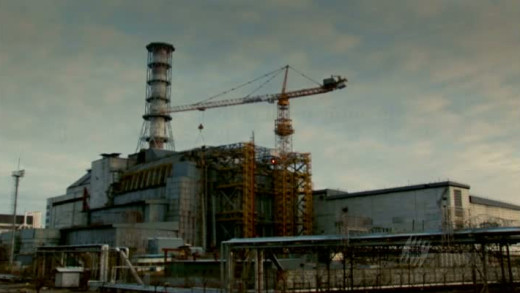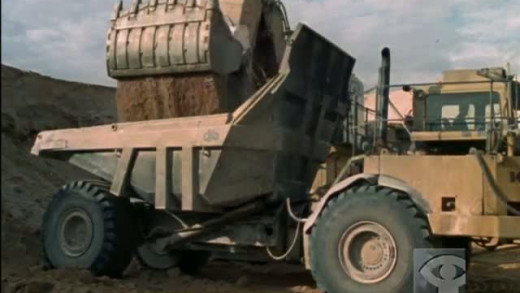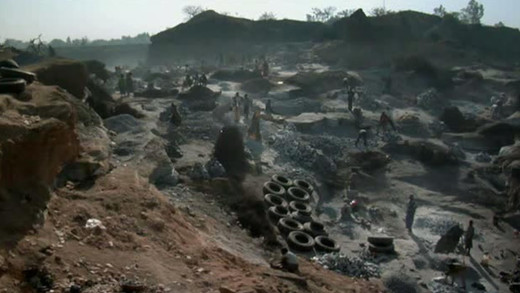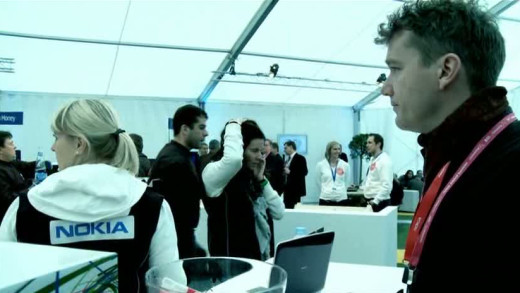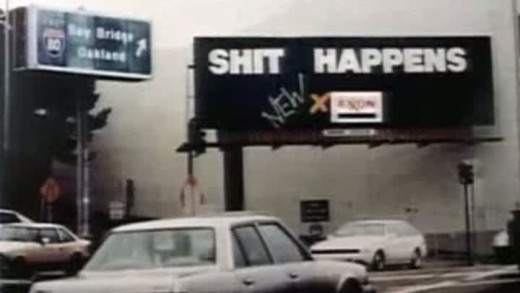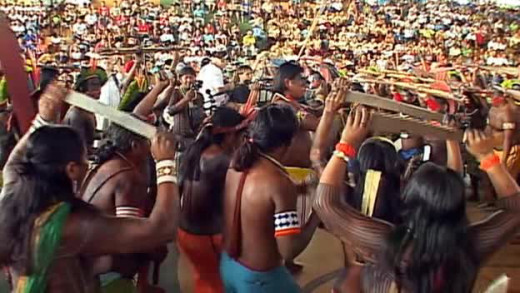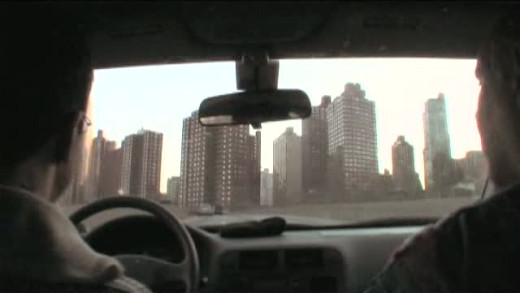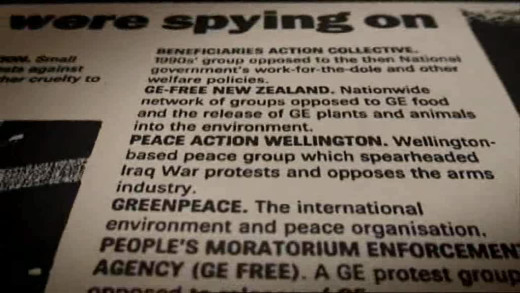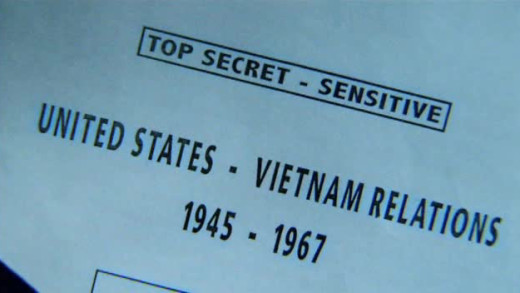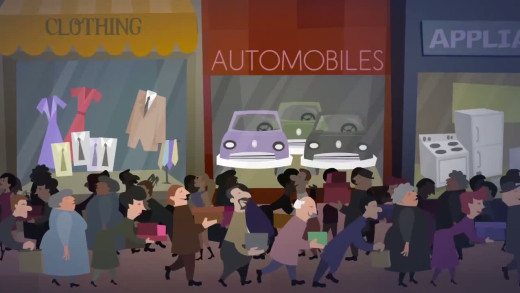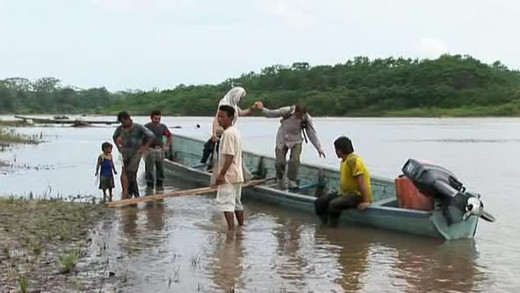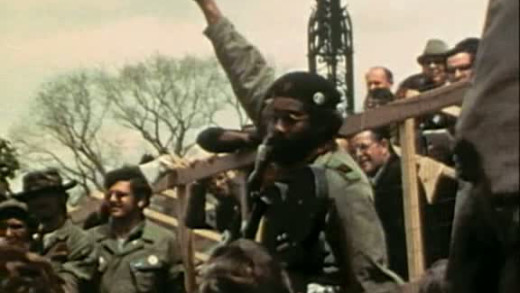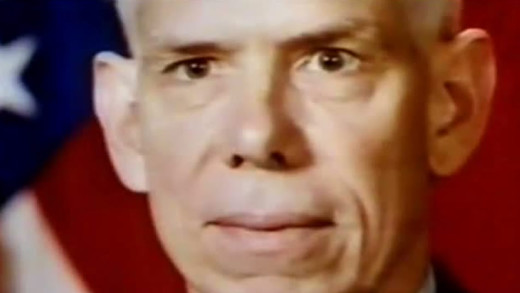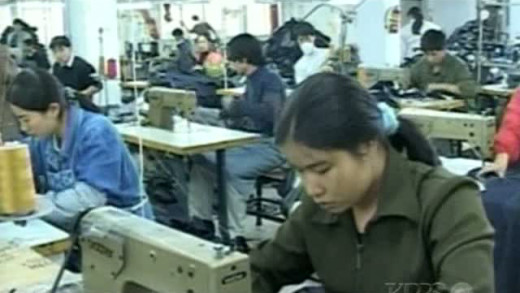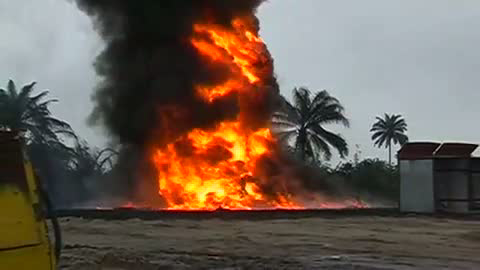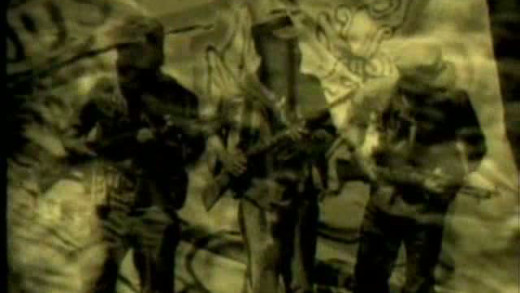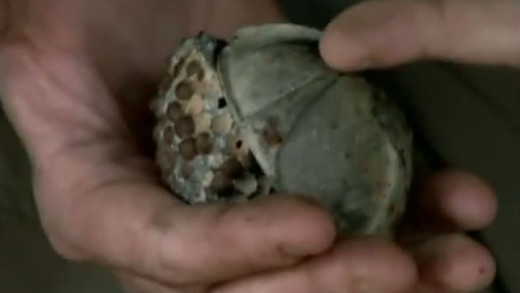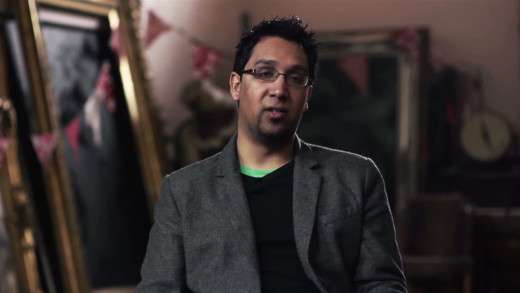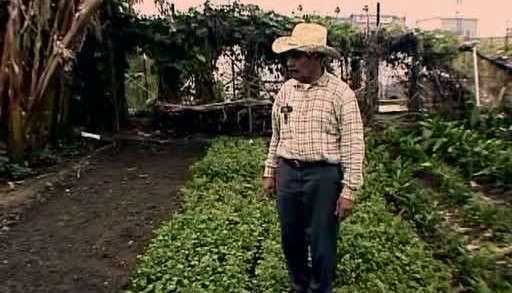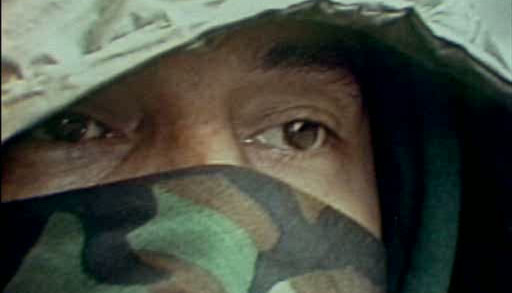Ground Noise And Static is a video report on the protests that occurred in connection with the Democrat and Republican National Conventions in 2008. Corporate media would cover the platitudes and posturing of the politicians, but this film is interested in something else -- a story hidden in plain sight, told from the perspective of activists...
Enemy Image
Enemy Image overviews the history of the portrayal of war in television news from the perspective of the United States. The film starts with the coverage of Vietnam where reports happened with little supervision, control or interference. Following this, The Pentagon takes action to control access by journalists to battle areas in subsequent invasions--such as the Invasion of Grenada, where journalists were excluded completely--to the first Gulf War, where 'news packages' were provided directly from the military; to the embedded churnalism of the invasion of Iraq. Shown is the progressive tightening of control by the US military on the contact journalists have with soldiers and civilians in the war zone, in order that "never again will television raise the moral and political questions that face a people during war."
More than 40 years after his death, the body of former CIA scientist Frank Olson has been exhumed. Olson's son Eric is convinced his father was murdered by agents of the government because he wanted to leave the CIA. Frank Olson was an expert for anthrax and other biological weapons and had top security clearance. Forensic pathologists at George Washington University performed an autopsy and concluded that Olson probably was the victim of a violent crime. Codename Artichoke documents these strange aspects of the CIA's quest for mind control drugs, with programs like MKULTRA, MKDELTA, Artichoke, Operation Midnight Climax and others...
Coca Or Death delves into Bolivia -- a country torn apart by the demands of the western world for coca. This film investigates why bloody battles have broken out between farmers and armed troops on the streets of La Paz, and what the impact of privatisation is having through the country. Coca has become a symbol of national resistance in Bolivia...
Blood Coltan travels to eastern Congo, where a bloody war is happening over a precious metal called Coltan—a raw material used in electronic devices such as computers, televisions and mobile phones. The demand for Coltan is driven by the west, funding the war in Congo between rebel militias and children as young as ten who work the mines hunting for this precious material of the technocratic age...
Mark Kennedy was an undercover police officer who spent eight years as a infiltrator and informer on environmental movements and other protest groups throughout Europe. Confessions of an Undercover Cop accounts the actions of Kennedy from his perspective, which reveals an insight into the dark, twisted psychology of a police informant and the methods they use to destabilise movements and activists...
People from industrial civilisation are fast to defend it, saying that they depend on this way of life for survival. It's an addiction. But what if civilisation is the very thing that is killing us and everyone else around? How could we survive then? The Fuck-It Point is about this pervasive disabling mindset of civilisation, its true cost, why and how we need to stop it from killing the planet, and why most people from civilisation don't want to do this. Will you do what is necessary to stop this culture from killing the planet?
The Nuclear Comeback embarks on a tour of the nuclear industry, documenting some of the most 'famous' nuclear facilities worldwide -- the control room of the Chernobyl nuclear power plant, the UK's Calder Hall, a nuclear waste repository under the Baltic Sea, the Ranger uranium mine in Australia, and one of only two nuclear waste "recycling plants" in the world. In addition of the links to nuclear weapons, the nuclear industry has a reputation for accidents and cover-ups. What are the 'risks'? What to do with the 100,000+ year legacy of dangerous radioactive waste? Is this insane?
Uranium
Focusing specifically on mines in Canada, Uranium examines the hazards of uranium mining, the toxic and radioactive waste involved at every stage of the process, as well as the wholistic way that indigenous communities have been violated and destroyed by mining and refining practices throughout the country and the world...
Let's Make Money investigates the development of the world-wide financial system, showing that elitists economically exploit the rest of society, especially in the developing world, but also in western nations. Using the savings of a typical depositor as a case study, the film moves around the global system, showing exploitation at many levels. There are several interviews with investment managers, politicians, economists as well as homeless people and workers who give their take on the system and its impacts...
Modern society loves mobile phones -- the selection between different models and gadgets has never been bigger. But the production of this technology has a hidden, dark, bloody side. The main minerals used to produce mobile phones are coming from the mines in the Eastern DR Congo. The Western World is buying these minerals up at a furious rate, financing a bloody civil war which, during the last 15 years, has cost the lives of more than 5 million people. Blood In The Mobile explains the connections between mobile phones and the civil war in the Congo, while technology corporations whitewash the issue to "supply and demand" and claim ignorance...
Culture Jam
Culture Jam documents a movement against advertising and the repurposing of commercial messages by following pranksters and subversive artists as they hijack, subvert and reclaim corporate media space in the battle of public 'mind-share' dominated by the consumer culture. Stopping in San Francisco, New York's Times Square and other parts of the United States, Culture Jam documents some jamming in action—armed with everything from DIY anti-ad stickers, custom neon, to the art of performance and guerilla film screenings—to illustrate just some of what people can do to push back against the saturation of commercial media messages in public space.
In 2003, on the eve of the Iraq war, director Iara Lee embarks on a journey to better understand a world increasingly embroiled in conflict. Several years later, after travelling to five continents, Lee encounters growing numbers of people who have committed their lives to change. From Iran to Burma to Palestine and Lebanon, Cultures Of Resistance explores how art and creativity can mould with the greater culture of resistance, a part of the battle for peace and justice...
Following up from The End Of Suburbia, this film examines the rich interplay on the subtle relationships between the energy crisis, neighbourhood gardens and the collapse of the 'American dream'. Escape From Suburbia outlines potential solutions with interviews from individuals across the world who are brave enough to challenge their communities toward change...
On October 15th 2007, a series of intense police raids occurred around the small village of Ruatoki in New Zealand. Operation 8, as it was called, was the result of 18 months of invasive surveillance of Maori sovereignty and peace activists accused of attending 'terrorist training camps' in the Urewera ranges—the homeland of the indigenous Tūhoe people. This film examines why and how the raids took place. Did the "War on Terror" become a global witch-hunt of political dissenters reaching even to the South Pacific?
In 1971, Daniel Ellsberg shook the United States to its foundations when he leaked top-secret Pentagon documents to the New York Times that showed how five Presidents consistently lied about the Vietnam War. Consequently, National Security Advisor Henry Kissinger called Ellsberg "the most dangerous man in America," who "had to be stopped at all costs." But Ellsberg wasn't stopped. Facing 115 years in prison on espionage and conspiracy charges, he fought back...
Combining graphs and other visual examples in animation, this short film goes through the issues surrounding the collapse of industrial civilisation--by collating the interconnectedness of energy depletion, carrying capacity, population growth, peak natural resource extraction, and other issues with the problems of exponential economic growth on a finite planet. Can this current way of life continue? The film takes us through these problems and also examines some of the many flaws inherent in some proposed solutions, such as 'change-by-personal-consumer-choice', or the vague belief in technology as the deus ex machina to save the day. These serious problems need serious solutions and require a radical rethinking of this current way of life that cannot continue indefinitely. Time is short...
Crude
As one of the largest and most controversial legal cases on the planet, Crude takes a look inside the $27 billion "Amazon Chernobyl" case, viewing the real-life high stakes legal drama set against a backdrop of the environmental movement, globalisation, hackneyed celebrity 'activism', human rights, multinational corporate power and rapidly-disappearing indigenous cultures...
Sir! NO Sir!
Sir! NO Sir! tells the story of how--from the very start of the war, such as with the Green Berets--there was resentment within the ranks over the difference between the war in Vietnam and (as persons state in the film) the "good wars" that their fathers had fought. In the beginning some simply left the military as individuals, though over time, it became apparent that so many were opposed to the war that they could speak of a movement -- which over time eventually made the military almost inoperable...
Crazy Rulers of the World is a series that investigates what happens when chiefs of the United States intelligence agencies and the army began believing in very strange things. With first-hand access to the leading characters in the story, filmmaker Jon Ronson examines the extraordinary and bizarre national secrets at the core of the war on terror.
China Blue
Shot clandestinely at a blue jeans factory in southern China where a young girl and her friends work around the clock for pennies a day, China Blue reveals what international retail companies don't want us to see: how the clothes are actually made...
Walmart is an iconic American company, known worldwide for selling cheap retail goods. While economists and global marketers call Walmart a success, there are many stories of mistreatment of employees, and a general feeling of mistrust and discontent among the businesses it has destroyed, such as local community stores. Walmart -- High Cost Of Low Prices highlights that it is worth being aware of the labour, social and corporate governance practices of companies that you do business with...
The Niger Delta is still an environmental disaster after more than fifty years of oil exploitation. One and a half million tons of crude oil has been spilled into the creeks, farms and forests so far. Natural gas contained in the crude oil is burnt off in gas flares which spread toxins, acid rain and destroy crops. Poison Fire documents the life of the locals in impoverished communities, creeks full of crude oil, devastated mangrove forests, wellheads leaking gas, all working to fight against oil giant Shell to at least stop the toxic gas flares...
The day the North American Free Trade Agreement (NAFTA) comes into effect, several thousand soldiers take over half the state of Chiapas, declaring a war against the global corporate power they say rules Mexico. They call themselves the Zapatista National Liberation Army. Zapatista shows this uprising, the story of a peasant rebellion, armed and up against the first world military. It is the story of a movement that transformed Mexican and international political culture.
Between 1964 and 1973 the United States conducted a secret war in Laos -- dropping over 2 million tons of bombs, making it the most heavily bombed country in history. Millions of 'cluster bombs' did not explode when dropped, leaving the country massively contaminated with "bombies" which are as dangerous now from when they fell over 30 years ago. Bombies documents unexploded cluster bombs through the personal experiences of a group of Laotians and foreigners who go about dismantling the bombs. These weapons are still a standard part of the United States military arsenal and were recently dropped in Kosovo, Afghanistan and Iraq...
The Crisis of Civilization draws on archive footage and essentially monologue by author Nafeez Mosaddeq Ahmed to detail how global problems like environmental collapse, financial crisis, peak energy, terrorism and food shortages are all symptoms of a single, failed global system...
The Garden
The Garden tells the story of South Central Farm -- a 14 acre community garden and urban farm located in Los Angeles, California, which was in operation between 1994 and 2006. The entire lot is evicted and demolished against overwhelming local support for the farm and also despite the community raising an incredible amount of money to purchase the land from the owner. The owner refuses to sell and the land is demolished and still sits vacant, unused...
Kanehsatake: 270 Years of Resistance documents the 'Oka Crisis' of 1990 in which the government of Oka, Canada, pushed for plans to develop a private golf course and new luxury housing on sacred indigenous land. The film captures the events as they unfold, from the beginnings as frivolous government 'negotiations' to the resulting siege by the Canadian Army and local police...

